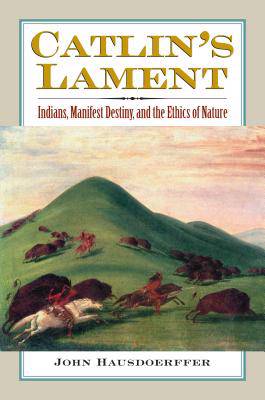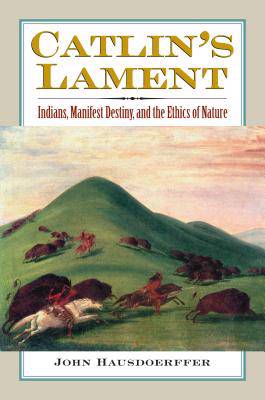
En raison d'une grêve chez bpost, votre commande pourrait être retardée. Vous avez besoin d’un livre rapidement ? Nos magasins vous accueillent à bras ouverts !
- Retrait gratuit dans votre magasin Club
- 7.000.000 titres dans notre catalogue
- Payer en toute sécurité
- Toujours un magasin près de chez vous
En raison de la grêve chez bpost, votre commande pourrait être retardée. Vous avez besoin d’un livre rapidement ? Nos magasins vous accueillent à bras ouverts !
- Retrait gratuit dans votre magasin Club
- 7.000.0000 titres dans notre catalogue
- Payer en toute sécurité
- Toujours un magasin près de chez vous
Catlin's Lament
Indians, Manifest Destiny, and the Ethics of Nature
John Hausdoerffer
Livre relié | Anglais
39,45 €
+ 78 points
Description
George Catlin gained renown for his nineteenth-century paintings of Indians and their lands, sympathetic portraits that counterbalanced those of other Americans eager to conquer and dominate both. In this first book to probe the attitudes that shaped and constrained Catlin's career, John Hausdoerffer argues that, despite his sympathies, Catlin's work embodied the same prevailing sentiment toward Nature that sanctioned Indian removal and thus undercut his own alternate vision for westward expansion. Some see Catlin as an ethical spokesman for Indians, others as a mere exploiter. Hausdoerffer steers a middle course, recognizing Catlin as an entrepreneur without invalidating his ethical perceptions. Yet through a close reading of Catlin's writings, Hausdoerffer adjusts interpretations of Catlin as a proto-environmentalist and friend of the Indian, arguing that contradictions in his work reveal his failure to comprehend his own complicity in Native America's demise. Hausdoerffer examines key events from Catlin's career to show how his work consistently teeters between resistance and consent to nineteenth-century ideologies of Nature. He reviews Catlin's decision to devote his talents to Native American concerns, his journey west to document "vanishing" lifeways, his presentation of his findings to American audiences, and his performance of his work in Europe. He also shows the importance of Yellowstone National Park in understanding Catlin, given his vision for it as a means of preserving what is essential about environments and cultures. Exploring the tension between Catlin's search for success and his awareness of the plight of his subjects, Hausdoerffer argues that Catlin's tacit acceptance of the inevitable demise of Native culture undermined his interest in fomenting political change. Catlin's lament for the vanishing Indian combined with his belief that art preserves the essence of nature ultimately contradicted his hopes for Indian justice and environmental preservation. Catlin's Lament challenges views of Catlin's career as an ethical downfall, revealing instead a complexity of character that complicates views of dissent in the Jacksonian era. More important, it questions underlying assumptions of Manifest Destiny, showing that they were so deeply set in American life that even critics of the age helped perpetuate them.
Spécifications
Parties prenantes
- Auteur(s) :
- Editeur:
Contenu
- Nombre de pages :
- 200
- Langue:
- Anglais
Caractéristiques
- EAN:
- 9780700616312
- Date de parution :
- 10-02-09
- Format:
- Livre relié
- Format numérique:
- Genaaid
- Dimensions :
- 160 mm x 234 mm
- Poids :
- 430 g

Les avis
Nous publions uniquement les avis qui respectent les conditions requises. Consultez nos conditions pour les avis.






